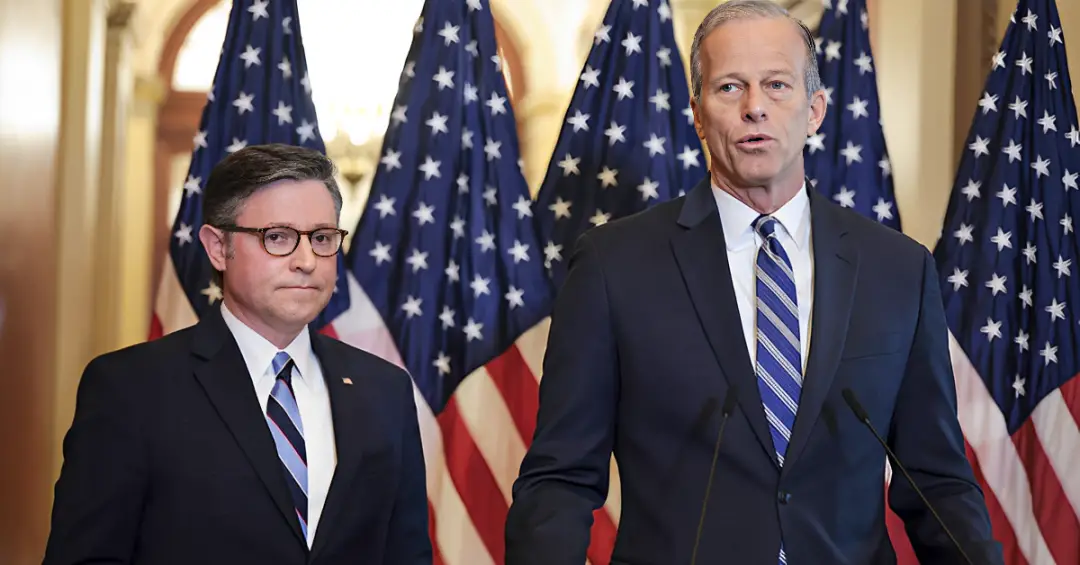Congressional Republicans are planning something major — a huge policy bill they’re calling the “big, beautiful bill.” But while the idea sounds promising, actually getting it done is turning out to be much harder than expected. The Republicans in both the House and the Senate can’t seem to agree on many of the most important parts of the bill, raising serious concerns that the plan might fail altogether.
On Thursday, the House passed a fiscal plan that sets the stage for this big legislation. But instead of bringing the party together, the vote exposed deep differences between Republicans in the House and those in the Senate. These differences are now threatening to derail the entire plan.
The bill is expected to cover a wide range of domestic policy goals — from tax cuts and border security to energy policy and spending cuts. But making all of that happen in one big package is proving to be a tough job, especially with so many voices within the party pulling in different directions.
Big Promises, Bigger Problems
House Speaker Mike Johnson has promised conservative Republicans, also known as fiscal hawks, that the bill will include major spending cuts. On the other hand, Senate Republicans, led by John Thune, are trying to stay flexible so they can keep everyone in their chamber on board. But the reality is that many of the ideas being discussed are totally opposite of each other, and that’s creating major roadblocks.
Senator John Kennedy from Louisiana put it plainly: “We can spend an entire year getting nothing done.” He knows from experience that just because both sides talk a lot doesn’t mean they’ll actually agree on a final product.
Many Republicans are remembering what happened in 2017. Right after Donald Trump became president, the party rushed to pass a healthcare reform bill. That effort failed, and it set them back for months. Now, there’s the worry that history might repeat itself.
Time Pressure and Growing Divides
Some lawmakers are pushing for quick action. Senator Lindsey Graham wants the bill ready for former President Trump’s approval by Memorial Day. He even suggested that if things don’t move quickly, the party should break the bill into smaller parts to avoid delays.
Senator Kennedy suggested setting a 60-day deadline and even calling in Trump himself to help solve disagreements. “Senators have to assert themselves,” he said. “They can’t just complain over lunch.”

Both Johnson and Thune understand the urgency. They’ve told their committee leaders to spend the current two-week break talking to their fellow lawmakers and trying to find common ground. Their goal is to start drafting sections of the bill by the time Congress returns at the end of the month.
According to House Budget Chairman Jodey Arrington, the House will take the lead in writing the first draft. He also supports the idea of finalising everything by Memorial Day. But Arrington warned that if the Senate changes the bill too much, it could destroy the “America First” agenda and delay everything even more.
The House vs. The Senate
But here’s the problem — Senate Republicans are not used to just agreeing with whatever the House sends over. In fact, they’ve already said they won’t stick to the House’s aggressive goal of cutting at least $1.5 trillion in government spending.
Instead, the Senate is aiming for much smaller cuts. Even though Thune tried to show support for Johnson’s spending goals, he avoided making any promises. He admitted that even in the Senate, Republicans are divided over how much to cut.
Senator Lisa Murkowski from Alaska said she’s not sure how the two chambers will be able to agree on such a wide range of goals.
Meanwhile, Speaker Johnson has his own problems. He made some strong promises to get the House’s budget plan passed last Thursday. He told conservative lawmakers that the final bill would stick to the $1.5 trillion cut target. In fact, he was so determined to win their support that he told them they could remove him from his position if he didn’t keep his word.
Tensions Rising Over Medicaid and Tax Cuts
The battle over spending is already starting to create more drama. Thune recently commented that Republicans are on “both sides” of the $1.5 trillion goal. That triggered a quick reaction from Rep. Chip Roy, a conservative from Texas. Roy strongly disagrees with a Senate plan that treats an extension of Trump’s 2017 tax cuts as having no cost. He warned that if the bill fails to meet the spending cut goals, he won’t support it.
Even Senate Republicans who usually go along with party leadership are getting nervous. Senator John Cornyn said he’s worried the final bill might avoid making real spending cuts. “We have a tradition around here of eating our dessert and not our vegetables,” he said — meaning lawmakers like to pass popular items like tax cuts, but avoid tough decisions like cutting spending.
Trump May Have to Step In
With all these disagreements, many believe Trump will eventually need to step in to solve the problem. Senator Kennedy said Trump may have to “break the tie,” “arbitrate the trade-offs,” and “put his muscle behind” the bill to make sure it gets passed.
One of the hardest issues may be Medicaid, the government program that helps low-income people get health care. The House budget requires a massive $880 billion reduction in spending from the Energy and Commerce Committee — a number that may be impossible without cutting Medicaid.
But cutting Medicaid is risky. It could cost Republicans support from both lawmakers and the public. Some Republicans are open to small changes like requiring recipients to work, but others are firmly against any changes to Medicaid expansion, which helps millions of Americans.
Struggling to Find Balance
Speaker Johnson already had to promise moderate Republicans that he wouldn’t cut Medicaid benefits for people who qualify. That promise was necessary to win their votes on the budget plan.
Representative Nicole Malliotakis said clearly: “We would not vote for anything that takes away benefits from legally eligible recipients.”
The challenge for Republicans now is to find a balance between conservative demands for deep cuts and more moderate voices who want to protect essential programs like Medicaid.
And all of this needs to be done fast, or the bill could collapse under its own weight.
In short, while the Republicans are aiming for a “big, beautiful bill,” they have a big, messy situation right now. With time ticking and disagreements growing, the risk of failure is real, and once again, the future of a major GOP policy effort could end up depending on Donald Trump.
Disclaimer: This article has been meticulously fact-checked by our team to ensure accuracy and uphold transparency. We strive to deliver trustworthy and dependable content to our readers.




